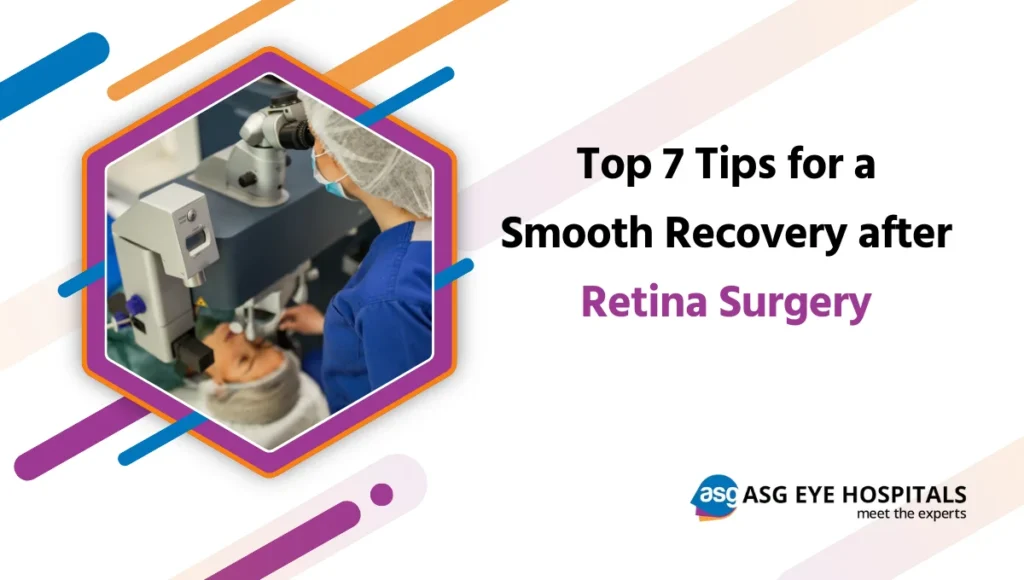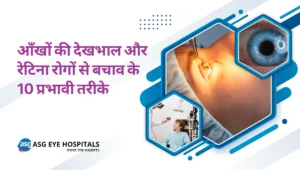Once the surgery is completed, it could be a good beginning towards your vision preservation or its correction, but when comes to the recovery phases, be treated and followed up with advice. If you underwent retinal surgery or some other conditions that affect the retina. Here we discuss 7 retina surgery recovery tips that help you to achieve a smooth recovery for optimum outcome.
1. Carefully Follow Post-Operative Instructions
Depending on your specific surgery and condition, your surgeon gives you the post-operative instructions that are highly important for the success of your retina surgery recovery. Details might include advice on medication, care for your eyes, activities you cannot do during recovery, and appointments for follow-up treatment. All these are done by a surgeon under strict orders to avoid doing something that can create a mess for your recovery and complications in results.
Key Steps:
- Take all prescribed drugs like eye drops according to the prescription.
- Follow up with your primary care physician at every scheduled follow-up as this is crucial for knowing how everything is healing.
- If you have a question or concern, call your surgeon rather than trying to figure it out yourself.
2. Eye Protection
Your eye becomes very sensitive after retina surgery. You may need to avoid physical traumas or environmental irritants. Your doctor may advise you to wear an eye shield or protective eyewear at least in the immediate postoperative period.
Action Plan:
- Wear any eye shields or protective eyewear prescribed by your doctor.
- Avoid rubbing or touching your eye.
- Stay away from dusty, smoky, or irritating environments.
3. Rest Activity
Physical activity might increase intraocular pressure or stress which can delay the surgery healing process. Your surgeon will advise you to limit or avoid some physical activities. The advisable practices include avoidance of all exercises, lifting heavy weights, and bending over.
Actions:
- Avoid heavy lifting or any exerting activity.
- Never bend over or lift products or goods heavier than recommended.
- Your doctor should allow you to do light exercises, such as walking sometime after.
4. Proper Postures
Depending on the surgical intervention, you may need to adopt certain postures that help your retina to heal. For instance, many interventions call for your head to be adopted in a certain posture for a long enough time that your retina will strongly hold.
Key activities:
- Fulfill all prescriptions related to the positioning or placement of your head.
- The use of pillows or other assistive devices is advocated to support the required posture.
- Steer clear of practices that may detract from your recommended posture.
5. Manage Your Medication
Post-operative patients are usually put on various medications to prevent infections, reduce inflammation, and control pain. Such patients should adhere strictly to prescribed medication to ensure complete recovery. A patient should also be informed of any possible side effects or interactions with other drugs.
Key Actions:
- Follow the given times and quantities for all medications.
- Inform your healthcare provider if you experience any side effects or other abnormal symptoms.
- Do not try to treat yourself with over-the-counter medications or supplements.
6. Be Aware of Red Flags
Knowledge about ‘normal’ healing following surgery and the signs and symptoms of complications can help you get early access to medical care. Be aware of a change in vision or increase in pain, extreme redness of the eye, or the presence of red discharge.
Key Behaviors:
- Observe changes in your vision and perception of your eyes.
- If you have any of the following, see the clinic or emergency department
- Sudden loss of vision
- Floaters
- Flashes of light
- Find signs of infection: more redness, swelling, and pus.
7. Maintain a Healthy Way of Life
A healthy lifestyle tends to promote and maximize general healing and recovery. Proper nutrition, hydration, and avoiding smoking and alcohol use would make the process of recovery more fluid.
Important Things:
- Foods rich in vitamins and minerals. Generally, Vitamin A, C, and omega-3 fatty acids are believed to benefit eye health.
- Hydrate your body. It will eliminate its toxins. This will allow your other body parts to recover faster too; thus, your eyes also.
- Do not smoke or consume alcohol since they may develop defects while healing.
Conclusion
The retina surgery recovery period is important for your health eyes and vision. Stick to your surgeon’s post-operative instructions, take good care of your eye, and retain your activity level. Observing your body’s warning signals will make quick healing and a hitch-free process. A healthy lifestyle will further quicken the healing time and the outcome after your retina surgery. If there are unanswered questions or complications, do not hesitate to seek the advice and guidance of top retina consultants.



